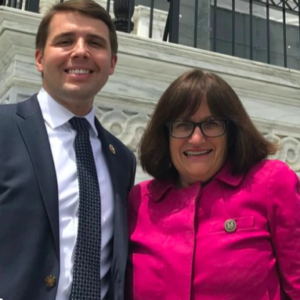During a campaign stop in Derry with Republican congressional candidate Matt Mowers, Arkansas Sen. Tom Cotton pointed out that Mowers’ opponent, Rep. Chris Pappas, voted to make Washington, D.C. a state.
“He voted to give the city of Washington — the ‘Swamp’ — as many senators as New Hampshire has. He wants Washington, D.C., with all of its influence peddlers and lobbyists and unelected bureaucrats to have the exact same voice in the U.S. Senate as New Hampshire,” Cotton said.
Pappas and his fellow Granite Stater Rep. Annie Kuster co-sponsored the “Washington DC Admission Act,” which passed the House with a 232-180 vote. All Democrats need is for a bill like this to pass the U.S. Senate, and a President Biden would be happy to sign it.
And New Hampshire’s doing its part in the Senate, too. Democrat Jeanne Shaheen told WMUR she also supports statehood for D.C. Along with Sen. Maggie Hassan, she’s supporting the Senate version of the DC Admission Act.
“I think Washington, D.C. should have statehood,” Shaheen said. As for the fact that adding D.C. would mean adding two Democratic U.S. Senators, Shaheen claimed:
“The legislation not only addressed statehood for Washington, D.C., but it also added seats on — in red states, so there would be a balance. The bill would not provide an automatic, immediate benefit to either Republicans or Democrats. I think that is the way we need to look at this issue.”
Except…the bill doesn’t. The DC Admissions Act Shaheen co-sponsored doesn’t mention adding any senators other than those for the District. Nor does it contain any reference to admitting any other state, such as Guam.
The Shaheen campaign declined repeated requests for clarification of her comments.
“Jeanne Shaheen’s support of ‘packing the Senate’ is once again evidence we need to send her packing,” said Mike Biundo, senior advisor to the Corky Messner campaign told NHJournal.
“Statehood for Washington, D.C. and Puerto Rico is not about equal representation or other high-minded ideals — making them states would mean four more Democrat seats in the Senate, and that’s the goal — controlling the Senate allows Democrats to advance their progressive agenda, including abolishing the Electoral College and packing the Supreme Court,” Biundo said.
Meanwhile, Senate Republicans aren’t waiting for a Democratic majority to “pack the Senate,” as some call the D.C. statehood movement. At least three bills have been introduced to either block D.C. statehood outright or to implement a different solution to the “no taxation without representation” problem.
Two of the bills would return most of Washington, D.C. to the state of Maryland, to be represented by its senators and increase the size of the state’s congressional delegation. It’s an idea that’s unlikely to move forward, in part because most D.C. residents want their own state.
However, another obstacle is polling showing most Marylanders don’t want D.C., despite the addition of 700,000 people, a major metropolitan city, and a (theoretical at least) increase in taxable economic activity to their state.
A 2016 poll found just 28 percent of Marylanders supported annexing D.C., while 44 percent opposed it.
If their neighbors don’t want Washington to be part of their state, critics ask, why would the other states want to add it to the republic?

